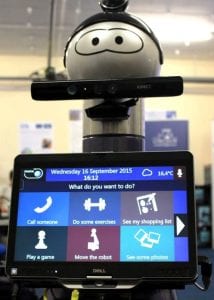Mobile service robots developed by computer scientists at the University of Lincoln could soon be helping elderly people stay independent and active for longer.
A new international project will test the ability of robots to support our ageing populations by assisting residents of care homes in three European countries.
ENRICHME (ENabling Robot and assisted living environment for Independent Care and Health Monitoring of the Elderly) will see service robots integrated with smarthomes – residences which incorporate advanced automation systems to provide inhabitants with sophisticated monitoring and control functions – in order to provide round-the-clock feedback to carers and health professionals. This will enable people with mild cognitive impairments to live more independently, and the robots will also help with activities that can improve quality of life, such as exercise and social visits.
The project, which includes artificial intelligence and robotics experts at the University of Lincoln’s School of Computer Science, will include a large-scale evaluation where robots will be deployed within the extra-care homes of LACE Housing Association in the UK, to care homes in Greece and to elderly people’s own homes in Poland, for one year.
Principal Investigator Dr Nicola Bellotto from the University of Lincoln said: “The system will build on recent advances in mobile service robotics and ambient assisted living to help people improve health and wellbeing. From a technological point of view there will be an intelligent interactive robot that is integrated with a smarthome, communicating with a network of care givers and relatives. This will be of particular benefit to those people who have mild cognitive impairments, for example older people who are still physically healthy but may have early symptoms of dementia.”
ENRICHME will enable caregivers and professional staff to identify evolving trends of cognitive impairments and to detect possible emergencies. This includes monitoring sudden changes in mood which might indicate deterioration, or the need for family or health services to step in.
Dr Bellotto added: “If the robot detects that the mood of the person is particularly low, it might suggest some kind of game or interaction with relatives. It could record information on how the mood changes and provide professional staff with feedback over a period of time, which would be very useful when studying the evolution of particular cognitive impairments.”
The robots will also be programmed to identify individual people in order to provide personalised services for elderly people living with others. New research in the field of adaptive human-robot interaction (HRI) will provide tools for the robots to support cognitive stimulation and social inclusion, which improve over time by learning from and adapting to the state of the user.
Hazel Ashmore, Project Lead Officer for LACE Housing, said: “Our focus at LACE Housing is on doing everything possible to enhance and maintain an older person’s independence and wellbeing, whatever their circumstances. This is an exciting opportunity to explore the potential benefits of assistive technology, particularly the introduction of robots in this case, to complement our usual operations. We look forward to working alongside the University of Lincoln and with colleagues from other European countries so that we can evaluate and learn more about, and so that our residents may benefit from, the use of such technology in the future.”
ENRICHME includes multi-disciplinary research in geriatrics, gerontology and gero-technology, enabling further studies in social sciences and neuropsychology.
The project is funded with a 4 million Euro grant from Horizon 2020, the EU Framework Programme for Research and Innovation for 2014-2020, of which 540,000 Euros have been assigned to support research at the University of Lincoln.
